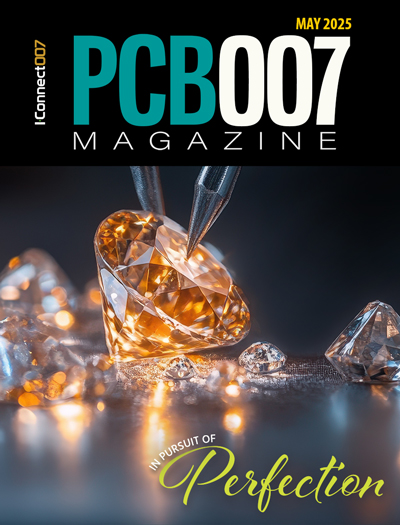-

-
News
News Highlights
- Books
Featured Books
- pcb007 Magazine
Latest Issues
Current Issue
The Hole Truth: Via Integrity in an HDI World
From the drilled hole to registration across multiple sequential lamination cycles, to the quality of your copper plating, via reliability in an HDI world is becoming an ever-greater challenge. This month we look at “The Hole Truth,” from creating the “perfect” via to how you can assure via quality and reliability, the first time, every time.

In Pursuit of Perfection: Defect Reduction
For bare PCB board fabrication, defect reduction is a critical aspect of a company's bottom line profitability. In this issue, we examine how imaging, etching, and plating processes can provide information and insight into reducing defects and increasing yields.

Voices of the Industry
We take the pulse of the PCB industry by sharing insights from leading fabricators and suppliers in this month's issue. We've gathered their thoughts on the new U.S. administration, spending, the war in Ukraine, and their most pressing needs. It’s an eye-opening and enlightening look behind the curtain.
- Articles
- Columns
- Links
- Media kit
||| MENU - pcb007 Magazine
MacDermid’s Research Team Talks New Cyanide-free Immersion Gold at SMTAI
December 14, 2015 | Patty Goldman, I-Connect007Estimated reading time: 8 minutes
Nable: Every day is exciting. All we know is also what’s been publicly announced. As far as technical people like us are concerned, before or after the announcements, it doesn't change our daily responsibilities. We still work on solving technical problems. We try to come up with innovative solutions for our customers.
Goldman: It doesn't change what you're doing. You might just have a broader audience later on. As researchers, do you get out in the field much to work with customers?
Nable: Not so much. On occasion, if needed, we do go out in the field to provide support.
Santos: It's mostly the process specialists that go into the field. Once in a while, if the formulator needs to be in the field, then we may be called upon.
Goldman: Now, when your new processes first go to a customer, will you go with them for the very first tests and all that?
Santos: If necessary, we do provide support. The process specialist takes over when the product goes to the field. Bringing a product to the field is a long process. It starts with the researcher working on the formulation. If the formula is ready for scale up, let’s say from a liter beaker to a 50-liter tank, the process specialist then becomes heavily involved. When we scale up at our Waterbury site, both researcher and process specialist work together. We assess the performance and resolve issues we encounter until we meet all the requirements. When the product is brought to the field, the process specialist already has an idea and background of the requirements, performance, etc.
Goldman: Thanks so much for your time, and best of luck with both of your projects going forward.
Nable: Thank you.
Page 4 of 4Suggested Items
Driving Innovation: Direct Imaging vs. Conventional Exposure
07/01/2025 | Simon Khesin -- Column: Driving InnovationMy first camera used Kodak film. I even experimented with developing photos in the bathroom, though I usually dropped the film off at a Kodak center and received the prints two weeks later, only to discover that some images were out of focus or poorly framed. Today, every smartphone contains a high-quality camera capable of producing stunning images instantly.
Hands-On Demos Now Available for Apollo Seiko’s EF and AF Selective Soldering Lines
06/30/2025 | Apollo SeikoApollo Seiko, a leading innovator in soldering technology, is excited to spotlight its expanded lineup of EF and AF Series Selective Soldering Systems, now available for live demonstrations in its newly dedicated demo room.
Indium Corporation Expert to Present on Automotive and Industrial Solder Bonding Solutions at Global Electronics Association Workshop
06/26/2025 | IndiumIndium Corporation Principal Engineer, Advanced Materials, Andy Mackie, Ph.D., MSc, will deliver a technical presentation on innovative solder bonding solutions for automotive and industrial applications at the Global Electronics A
Fresh PCB Concepts: Assembly Challenges with Micro Components and Standard Solder Mask Practices
06/26/2025 | Team NCAB -- Column: Fresh PCB ConceptsMicro components have redefined what is possible in PCB design. With package sizes like 01005 and 0201 becoming more common in high-density layouts, designers are now expected to pack more performance into smaller spaces than ever before. While these advancements support miniaturization and functionality, they introduce new assembly challenges, particularly with traditional solder mask and legend application processes.
Knocking Down the Bone Pile: Tin Whisker Mitigation in Aerospace Applications, Part 3
06/25/2025 | Nash Bell -- Column: Knocking Down the Bone PileTin whiskers are slender, hair-like metallic growths that can develop on the surface of tin-plated electronic components. Typically measuring a few micrometers in diameter and growing several millimeters in length, they form through an electrochemical process influenced by environmental factors such as temperature variations, mechanical or compressive stress, and the aging of solder alloys.


